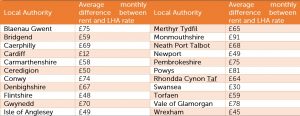 Housing
Housing 
Hugh Kocan discusses how the Local Housing Allowance is failing households, and why we need urgent change.
One of the largest costs faced by any household is the cost of keeping a roof over their head. In recent months, more and more households have been struggling to meet these costs with the Local Housing Allowance (LHA) failing to match rents. Our latest research indicates that just 24 properties advertised in May were available at LHA rates.
Over recent months there has been increased political interest in the Bevan Foundation’s work on the LHA and the challenges facing low-income renters. From the Senedd to Westminster, MSs and MPs have raised concerns based on the Foundation’s findings. This process has provided us with new insights into the way that the LHA works and its impact on homelessness.
Of particular interest to us at the Bevan Foundation has been the publication of new data by the UK Government in response to written questions submitted by Beth Winter MP and Hywel Williams MP. These highlight just how challenging the situation is for many low-income renters.
The scale of the rent gap
One of the key findings of the Bevan Foundation’s recent work on LHA is that the acute shortage of properties available to rent at LHA levels means that households are pushed into properties where there is a gap between their rent and how much they receive through benefits. This “rent gap” pushes households into financial hardship, with households forced to cut back on other essentials to find enough money to cover their rent.
The extent of the problem is significant. Recent data published by the DWP sets out the average monthly gap between rents paid by people in receipt of LHA and the actual LHA rate across all 22 Welsh local authorities, as of November 2021. The average gap varies from £12 for households in Cardiff, to £91 per month for households in Monmouthshire.

Understanding the gap
The UK Government’s decision to freeze LHA rates at 2020/21 levels is often cited as one of the main reasons for the emergence of a gap between rents and benefits. The decision to freeze LHA has undoubtedly had an impact but this is not the only contributory factor.
One factor that has had an impact on the emergence of a gap between LHA and the rents is that so many people who are only entitled to the shared accommodation rate live in one-bedroom properties. Single people under 35 and with no dependents are only entitled to enough support to cover the rent of a room in shared accommodation. An acute shortage of shared accommodation properties, however, means that many single people under 35 have little choice but to rent a one-bedroom home. New data published by the DWP in response to a question by Hywel Williams MP revealed that approximately 42% of people who claim Housing Benefit and who are only entitled to the shared accommodation rate live in one-bedroom properties. This significantly increases their risk of seeing a gap between their rent and their LHA entitlement.
Another factor that has contributed to the emergence of the gap between rents and LHA is a lack of data on the private rental sector in Wales. As we highlighted in our March 2022 report landlords are under no obligation to share data on how much they charge for rent. This means that we cannot have confidence that even if the LHA was regularly uprated to the 30th percentile, that it would actually reflect market conditions.
The problem goes even deeper. The DWP has revealed that it does not hold data on how much is spent annually on the housing element of Universal Credit in Wales in a readily accessible format. Furthermore, the DWP believe making this data available would present a disproportionate cost. This makes it almost impossible to undertake a comprehensive analysis of how public money is spent on housing in Wales, and inhibits our ability to have an informed discussion on a range of issues from the future of the housing sector, to whether powers over social security should be devolved to Wales.
Making the LHA work for Wales
The current policy on LHA is by most metrics failing households in Wales and the wider UK. Thousands of households are pushed into financial hardship as they try and cover the gap between their benefits and their rent from other income sources. For others, the gap can push them into homelessness or inadequate housing.
This is why the Bevan Foundation will be at Westminster this week to promote our calls for reform of the LHA. It is imperative that action is taken to increase the value of the LHA, to improve access to data and to scrap the shared accommodation rate. Taking such action is key if we are to ensure that everyone in Wales has access to a safe and affordable home.
Hugh Kocan is the Housing Policy Officer at the Bevan Foundation


